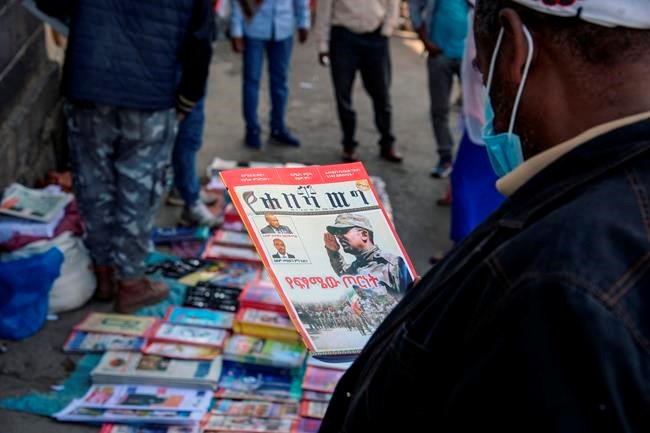NAIROBI, Kenya — Ethiopia moved Saturday to replace the leadership of the country’s defiant northern Tigray region, where deadly clashes between regional and federal government forces are fueling fears the major African power is sliding into civil war. Tigray's leader told the African Union that the federal government was planning a “full-fledged military offensive.”
Neither side appeared ready for the dialogue that experts say is needed to avert disaster in one of the world’s most strategic yet vulnerable regions, the Horn of Africa.
The upper house of parliament, the House of Federation, voted to set up an interim administration, giving Prime Minister Abiy Ahmed the power to carry out measures against a Tigray leadership his government regards as illegal. They include appointing officials and facilitating elections.
The prime minister, who won the Nobel Peace Prize last year, asserted that “criminal elements cannot escape the rule of law under the guise of seeking reconciliation and a call for dialogue.”
Experts and diplomats are watching in dismay as the two heavily armed forces clash. Observers warn that a civil war in Ethiopia, Africa's second most populous country with 110 million people, could suck in or destabilize
“It’s a very, very bad situation,” Audrey Van der Schoot, head of mission for aid group Doctors Without Borders in Ethiopia, told The Associated Press. Heavy shelling resumed Saturday morning, for the first time since Wednesday, near the group's outpost in the Amhara region by the Tigray border. It was so close, Van der Schoot could hear it over the phone.
The clinic has seen six dead so far and some 60 wounded, all combatants from Tigray and Amhara, she said, adding that shelling came from both sides.
A statement posted Saturday on the Facebook page of the Tigray government, the Tigray People’s Liberation Front, asserted that it will win the “justified” war, adding that “a fighter will not negotiate with its enemies.”
In a letter to the AU chairman, South Africa's president, Tigray leader Debretsion Gebremichael alleged that Ethiopia's federal government and
The letter dated Friday, seen by The Associated Press, called Abiy's
The conflict is playing out between former allies in Ethiopia's ruling coalition who now regard each other as illegal. The TPLF long dominated the country's military and government before Abiy took office in 2018 and introduced sweeping political reforms that won him the Nobel. The changes left the TPLF feeling marginalized, and it broke away last year when Abiy sought to turn the coalition into a single Prosperity Party.
Clashes began early Wednesday when Abiy accused the TPLF forces of attacking a military base in Tigray. In a major escalation Friday, Abiy asserted that airstrikes in multiple locations around the Tigray capital “completely destroyed rockets and other heavy weapons."
The military operations will continue, the prime minister said, and he warned the Tigray population: ”In order to avoid unexpected peril, I advise that you limit group movements in cities.”
Tigray is preparing for a “major offensive to come tomorrow or the day after from the federal government,” Kjetil Tronvoll, a professor at Bjorknes University College in Norway and a longtime Ethiopia watcher, told the AP. “That's my estimate. Abiy has promised a quick delivery of victory, so he has to move fast.”
Ethiopia's decision to replace the Tigray leadership leaves the region with essentially two options, he said: pursuing a “full-out war” with the aim of toppling Abiy's government or declaring independence.
Encircled, the TPLF can't afford a drawn-out conflict and might fight its way to the capital, Addis Ababa, or toward the Red Sea for an outlet, Tronvoll said.
He described one published estimate of Tigray having nearly a quarter-million various armed forces a “serious underestimate” and said they outnumber the federal army “by at least two or three multiples." Addis Ababa has called for reinforcements from other regional forces, he said.
Communications remain almost completely severed with Tigray, making it difficult to verify the rivals' assertions and leading aid groups and human rights groups to warn of a brewing humanitarian disaster.
A new United Nations assessment lists eight “recent military confrontations” across Tigray, most near its southern border with the Amhara region. The blockage of air and road networks significantly affects aid to more than a half-million people, the assessment said, and an escalation of fighting could “seriously increase” that number and send millions fleeing.
What’s more, “there is a concern that the vacuum left by security forces re-deployed from other critical areas may incite more ethnic violence including attacks on ethnic minorities” in other parts of Ethiopia, the U.N. report said.
Dino Mahtani with the International Crisis Group, in comments posted Friday, said that if the Tigray forces come under pressure they may "punch into Eritrea, which would then internationalize this conflict." The TPLF and Eritrea have a bitter history of a long border war between Ethiopia and Eritrea before the countries made peace in 2018.
The TPLF's only other real avenue out of Ethiopia is Sudan, which finds itself “in a very delicate position,” Mahtani said.
Sudan's eastern al-Qadarif province has closed its border with Ethiopia’s Tigray and Amhara regions, the Sudan News Agency reported Saturday.
The Tigray drama dominates conversation in Ethiopia, and many people commenting on social media appear to support the government’s move to get rid of the region's leadership. Some cite abuses by the TPLF while it was in power for well over two decades, or echo the federal government's accusation that it incited recent violence across the country.
Those sympathetic to the TPLF are mostly silenced due to the communications blackout in Tigray, but those able to comment describe the federal government's actions as an aggression that will lead to further escalation of the conflict.
___
Elias Meseret in Addis Ababa, Ethiopia, and Samy Magdy in Cairo contributed.
Cara Anna, The Associated Press



